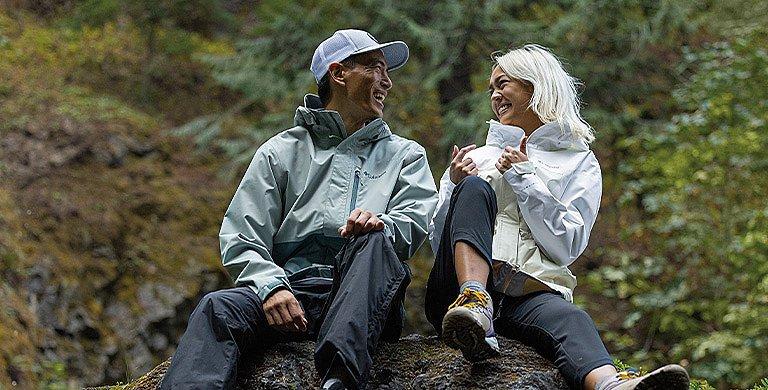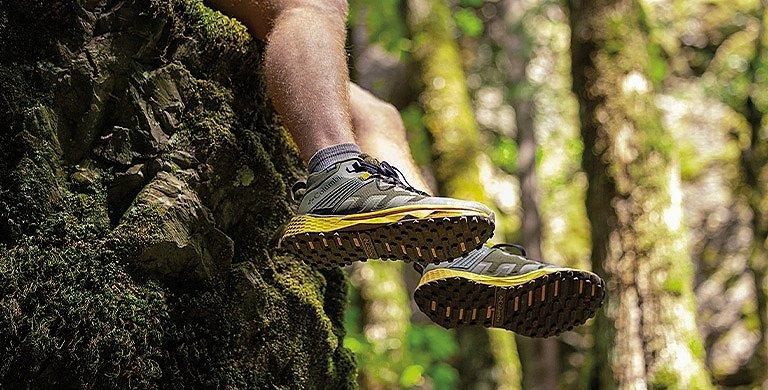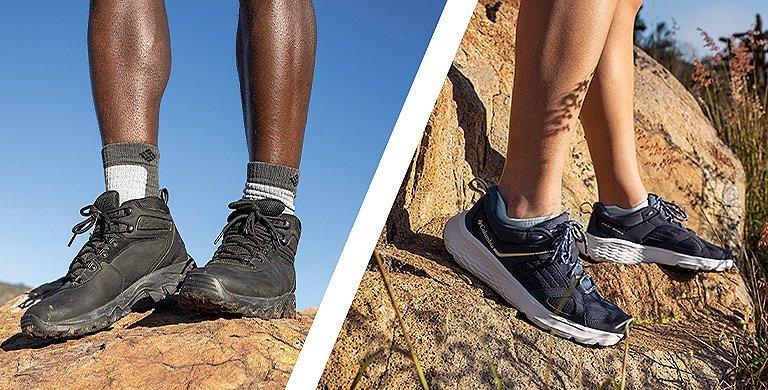HIKING
Stinky Shoes 101: How to Get Rid of Hiking Boot Odor
If stinky shoes are bringing you down post-hike, here’s how to get rid of boot odor
BY RACHEL CAVANAUGH
We’ve all been there: You go on an epic hike. You climb a big mountain or you conquer a bunch of switchbacks, and you have so much fun that you don’t even realize how hard you’re working. That is, until you get home. You open the door, kick off your boots, and immediately recoil in horror. Yikes—what’s that stench? It couldn’t possibly be your shoes, could it? Hopefully there’s no one around because you’re pretty sure the odor wafting from your feet is not socially acceptable.
It’s times like these when you need to know how to clean smelly hiking boots—and fortunately, as makers of hiking boots, we’re experts in this subject. To help you get all the knowledge you need to successfully remove the stink from your shoes, we reached out to Columbia Sportswear Director of Footwear Shane Downey to get some insider intel. Read on for all the details.
It’s times like these when you need to know how to clean smelly hiking boots—and fortunately, as makers of hiking boots, we’re experts in this subject. To help you get all the knowledge you need to successfully remove the stink from your shoes, we reached out to Columbia Sportswear Director of Footwear Shane Downey to get some insider intel. Read on for all the details.
How to get rid of hiking boot odor
Unfortunately, once odor has set into hiking boots, it's not as easy as just spraying them down with fabric freshener. The odor comes from bacteria and fungus, so it’s difficult to mask the smell. Attempting that typically only results in hiking boots that smell like a combination of floral bouquets and rancid foot funk.
Downey recommends starting with dish soap and hot water—this is often enough to remove the odor without having to buy anything special. To clean hiking boots this way, simply wet a rag and gently wipe the boots down or use a soft bristled brush, making sure to hit both the inside and the outside. “Don’t dunk the shoes,” he explains. “You want to avoid impacting the stitching.”
If the odor isn’t too intense, the soap-and-water treatment may be enough. However, if the smell persists, you may need to invest in a shoe deodorizer. These solutions are made with special enzymes that consume bacteria and other organic matter that cause the smell. There are a variety of brand names out there—just make sure that whichever one you choose, it’s an enzyme-based product. Downey recommends sticking to sprays and wipes rather than solutions where you have to submerge your boots in water.
Downey recommends starting with dish soap and hot water—this is often enough to remove the odor without having to buy anything special. To clean hiking boots this way, simply wet a rag and gently wipe the boots down or use a soft bristled brush, making sure to hit both the inside and the outside. “Don’t dunk the shoes,” he explains. “You want to avoid impacting the stitching.”
If the odor isn’t too intense, the soap-and-water treatment may be enough. However, if the smell persists, you may need to invest in a shoe deodorizer. These solutions are made with special enzymes that consume bacteria and other organic matter that cause the smell. There are a variety of brand names out there—just make sure that whichever one you choose, it’s an enzyme-based product. Downey recommends sticking to sprays and wipes rather than solutions where you have to submerge your boots in water.
Will baking soda or vinegar work on shoe odor?
An enzyme-based shoe odor remover is the best thing to get the smell out of hiking boots. However, you may be wondering if you can use baking soda or vinegar in a pinch.
That depends on what kind of hiking shoes you have. Baking soda can work on certain shoes made from knit fabrics. But it can cause leather or suede to become brittle, so you’ll want to avoid it when you’re deodorizing hiking boots made out of those materials.
Vinegar is similar to baking soda in that it can work in certain scenarios, but other times it can damage your shoes. It’s not always apparent what the end result will be, so it’s best to stick to shoe odor removers or soap and water whenever possible.
Vinegar is similar to baking soda in that it can work in certain scenarios, but other times it can damage your shoes. It’s not always apparent what the end result will be, so it’s best to stick to shoe odor removers or soap and water whenever possible.
Don’t forget to dry your hiking boots
Once you’ve cleaned and deodorized your hiking boots, it’s likely that they will be fairly wet, even if you stick to using just a rag. To prevent them from getting smelly again, be sure to dry them properly. That means placing them out to dry right away and not letting them sit in a damp garage or on a rainy porch. Place them in direct sunlight and let them air dry. Don’t try to put them in the dryer, Downey explains, as heat can damage the shoe’s construction.
Can you put hiking boots in the washing machine?
At this point, you may be wondering, “Can’t I just put my hiking boots in the washing machine?” Unfortunately, this isn’t a safe option for your shoes due to the stitching and adhesives, which can be damaged by traditional washing machines. Whether you’re trying to get rid of funky smells or simply cleaning off the dirt and mud, always wash your hiking boots by hand.
Why do shoes smell?
As we mentioned above, the reason your hiking shoes smell is that bacteria, fungus, yeast, or other organic matter is growing inside them. When you sweat, your boots get both warm and damp, which creates the ideal breeding ground for bacteria and fungus. Those are the real odor culprits, which is why it’s important to make sure they don’t have the chance to proliferate.
How to prevent foot odor in hiking shoes
When it comes to keeping the smell out of your hiking boots, an ounce of prevention is worth a pound of cure. You can’t stop your feet from sweating (nor should you—that’s half the fun), but you can take a few simple steps to prevent the odor from building up.
First, get into the habit of spraying your shoes down with odor eliminators after every hike. Second, pick the right socks. You might not think about it, but this affects how your shoes smell too. You want to select socks made from breathable, moisture-wicking materials such as polyester and rayon instead of 100% cotton, which tends to absorb moisture and trap odor.
Lastly, don’t let dirt and mud collect on your boots—wipe them down with soap and warm water each time. In addition to tackling odor, this prevents dirt from getting caked in the zippers, where it can cause damage over time or begin to erode the fabric.
First, get into the habit of spraying your shoes down with odor eliminators after every hike. Second, pick the right socks. You might not think about it, but this affects how your shoes smell too. You want to select socks made from breathable, moisture-wicking materials such as polyester and rayon instead of 100% cotton, which tends to absorb moisture and trap odor.
Lastly, don’t let dirt and mud collect on your boots—wipe them down with soap and warm water each time. In addition to tackling odor, this prevents dirt from getting caked in the zippers, where it can cause damage over time or begin to erode the fabric.
Are your boots too far-funked to be saved? Check out our selection of new hiking boots and shoes.



